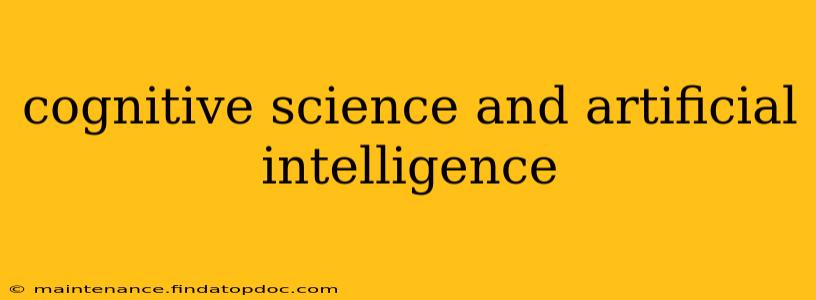Cognitive science and artificial intelligence (AI) are deeply intertwined fields, each informing and advancing the other. Understanding their relationship requires exploring how cognitive science provides the theoretical foundations for AI, while AI, in turn, provides tools and platforms to test and expand cognitive science theories. This symbiotic relationship is driving rapid advancements in both fields, leading to breakthroughs in areas like human-computer interaction, robotics, and our understanding of the human mind itself.
What is Cognitive Science?
Cognitive science is an interdisciplinary field that studies the mind, its processes, and its functions. It draws upon research from psychology, neuroscience, linguistics, philosophy, and computer science to understand how humans perceive, learn, remember, reason, and solve problems. Cognitive scientists investigate mental processes like attention, memory, language comprehension, decision-making, and problem-solving, often using computational models to represent these processes.
What is Artificial Intelligence?
Artificial intelligence aims to create machines capable of performing tasks that typically require human intelligence. This includes tasks like learning, problem-solving, decision-making, and language understanding. Different AI approaches exist, including machine learning (where systems learn from data), deep learning (using artificial neural networks with multiple layers), and symbolic AI (using logic and rules). Crucially, many AI systems are designed based on models inspired by cognitive science.
How Cognitive Science Informs AI
Cognitive science provides a crucial theoretical framework for AI development. By studying human cognitive processes, researchers gain insights into how to design more effective and efficient AI systems. For example:
- Understanding human perception: Cognitive science research on visual perception informs the design of computer vision systems, enabling machines to "see" and interpret images.
- Modeling human memory: Understanding different types of memory (short-term, long-term, working memory) helps in designing AI systems with improved memory capabilities and knowledge retention.
- Analyzing human language processing: Insights from psycholinguistics are fundamental to the development of natural language processing (NLP) systems capable of understanding and generating human language.
- Studying human decision-making: Cognitive science helps in creating AI systems that can make better, more informed decisions, considering factors like risk and uncertainty.
How AI Advances Cognitive Science
AI also provides powerful tools and techniques that advance cognitive science research. These include:
- Computational modeling: AI techniques allow cognitive scientists to build computational models that simulate human cognitive processes, providing testable predictions and helping refine theories.
- Brain-computer interfaces: Advances in AI are crucial for developing brain-computer interfaces, enabling researchers to study brain activity directly and gain deeper insights into cognitive processes.
- Big data analysis: AI-powered tools can analyze vast datasets of human behavior, providing new insights into cognitive functions and individual differences.
- Automated data analysis: AI algorithms can automate tedious tasks involved in analyzing cognitive data, allowing researchers to focus on interpreting results and formulating new hypotheses.
What are the ethical considerations of using AI to study the human mind?
The use of AI in cognitive science raises important ethical questions. Data privacy and security are major concerns, particularly when dealing with sensitive brain data. Ensuring fairness and avoiding bias in AI algorithms used to analyze cognitive data is also crucial. The potential for AI to reinforce existing societal biases needs careful consideration and mitigation. Transparency in the design and application of AI systems is essential to maintain public trust and ensure ethical research practices.
What are some examples of AI systems inspired by cognitive science?
Many AI systems are directly inspired by cognitive science principles. Examples include:
- Bayesian networks: These probabilistic models mimic how humans update their beliefs based on new evidence.
- Connectionist models: These artificial neural networks are inspired by the structure and function of the human brain.
- ACT-R (Adaptive Control of Thought–Rational): This cognitive architecture integrates various cognitive processes into a unified framework, influencing AI system design.
What is the future of cognitive science and AI?
The future of cognitive science and AI looks incredibly promising. Continued collaboration between these fields is likely to lead to even more sophisticated AI systems and a much deeper understanding of the human mind. This will likely involve advances in areas such as:
- Human-AI collaboration: Developing AI systems that effectively collaborate with humans to solve complex problems.
- Explainable AI: Creating AI systems whose decision-making processes are transparent and understandable.
- Neuro-symbolic AI: Integrating symbolic AI techniques with connectionist models to combine the strengths of both approaches.
In conclusion, the relationship between cognitive science and AI is a powerful synergy. As these fields continue to advance together, we can anticipate remarkable breakthroughs in our understanding of intelligence—both human and artificial.
